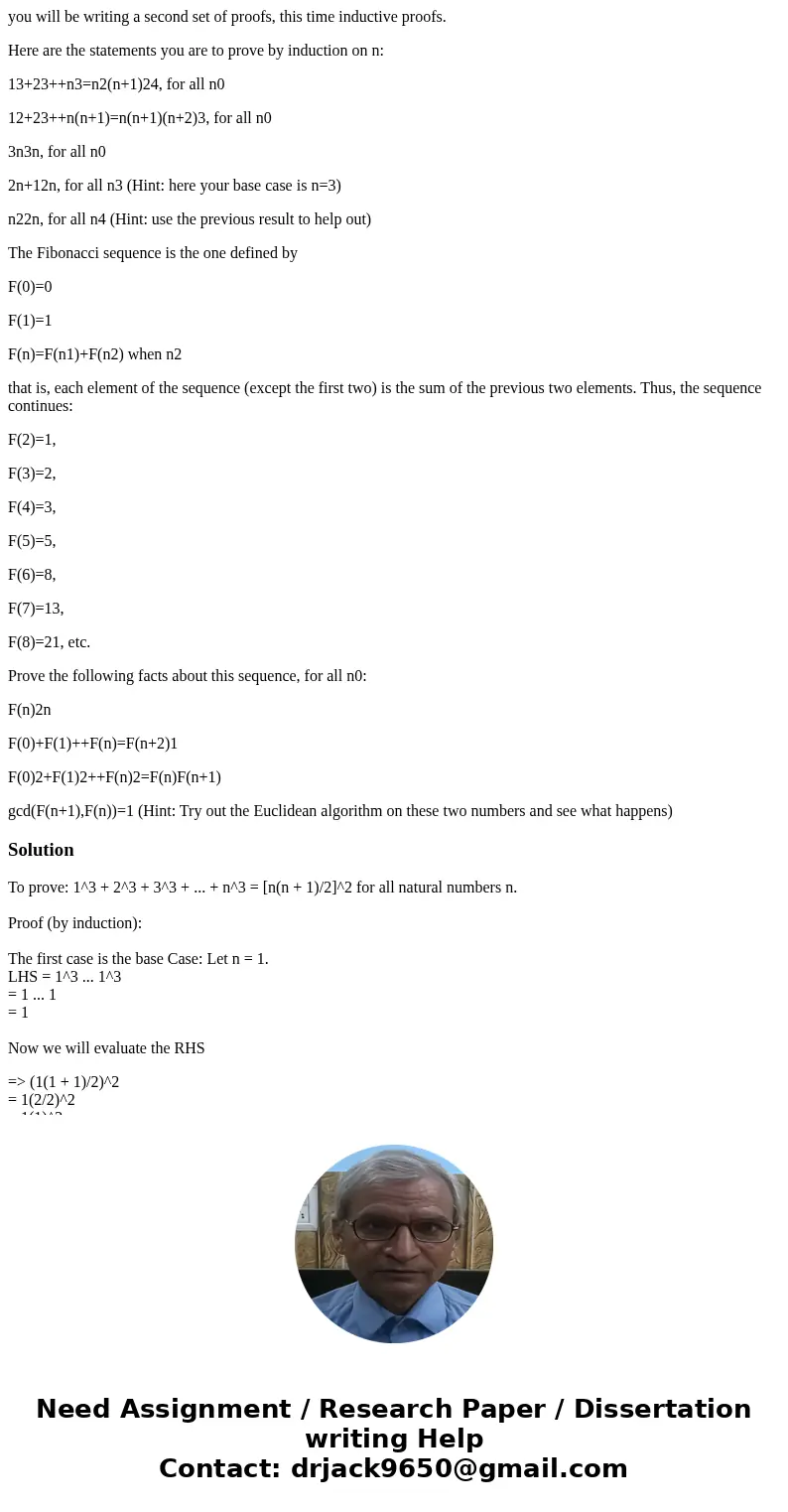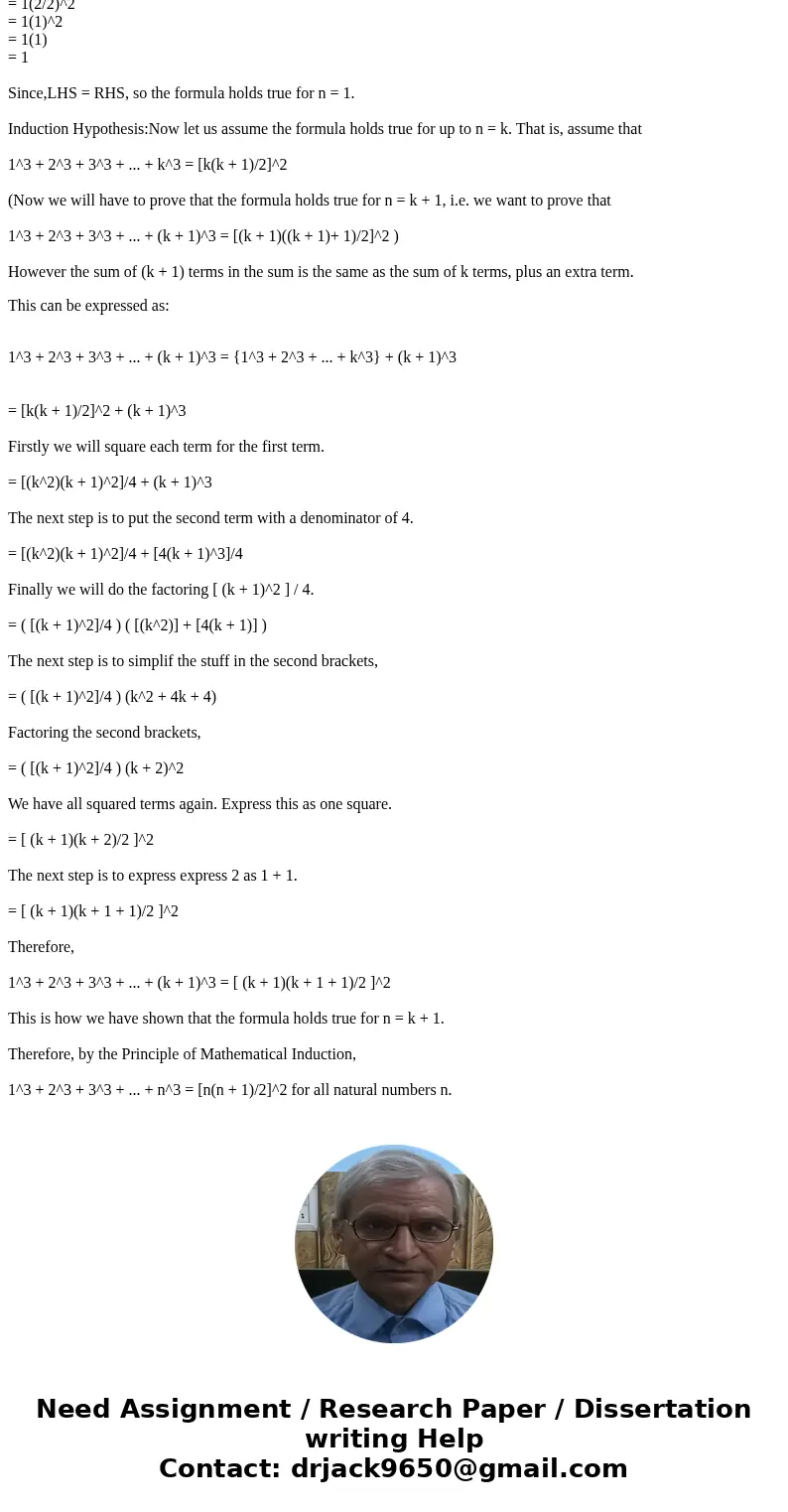you will be writing a second set of proofs this time inducti
you will be writing a second set of proofs, this time inductive proofs.
Here are the statements you are to prove by induction on n:
13+23++n3=n2(n+1)24, for all n0
12+23++n(n+1)=n(n+1)(n+2)3, for all n0
3n3n, for all n0
2n+12n, for all n3 (Hint: here your base case is n=3)
n22n, for all n4 (Hint: use the previous result to help out)
The Fibonacci sequence is the one defined by
F(0)=0
F(1)=1
F(n)=F(n1)+F(n2) when n2
that is, each element of the sequence (except the first two) is the sum of the previous two elements. Thus, the sequence continues:
F(2)=1,
F(3)=2,
F(4)=3,
F(5)=5,
F(6)=8,
F(7)=13,
F(8)=21, etc.
Prove the following facts about this sequence, for all n0:
F(n)2n
F(0)+F(1)++F(n)=F(n+2)1
F(0)2+F(1)2++F(n)2=F(n)F(n+1)
gcd(F(n+1),F(n))=1 (Hint: Try out the Euclidean algorithm on these two numbers and see what happens)
Solution
To prove: 1^3 + 2^3 + 3^3 + ... + n^3 = [n(n + 1)/2]^2 for all natural numbers n.
Proof (by induction):
The first case is the base Case: Let n = 1.
LHS = 1^3 ... 1^3
= 1 ... 1
= 1
Now we will evaluate the RHS
=> (1(1 + 1)/2)^2
= 1(2/2)^2
= 1(1)^2
= 1(1)
= 1
Since,LHS = RHS, so the formula holds true for n = 1.
Induction Hypothesis:Now let us assume the formula holds true for up to n = k. That is, assume that
1^3 + 2^3 + 3^3 + ... + k^3 = [k(k + 1)/2]^2
(Now we will have to prove that the formula holds true for n = k + 1, i.e. we want to prove that
1^3 + 2^3 + 3^3 + ... + (k + 1)^3 = [(k + 1)((k + 1)+ 1)/2]^2 )
However the sum of (k + 1) terms in the sum is the same as the sum of k terms, plus an extra term.
This can be expressed as:
1^3 + 2^3 + 3^3 + ... + (k + 1)^3 = {1^3 + 2^3 + ... + k^3} + (k + 1)^3
= [k(k + 1)/2]^2 + (k + 1)^3
Firstly we will square each term for the first term.
= [(k^2)(k + 1)^2]/4 + (k + 1)^3
The next step is to put the second term with a denominator of 4.
= [(k^2)(k + 1)^2]/4 + [4(k + 1)^3]/4
Finally we will do the factoring [ (k + 1)^2 ] / 4.
= ( [(k + 1)^2]/4 ) ( [(k^2)] + [4(k + 1)] )
The next step is to simplif the stuff in the second brackets,
= ( [(k + 1)^2]/4 ) (k^2 + 4k + 4)
Factoring the second brackets,
= ( [(k + 1)^2]/4 ) (k + 2)^2
We have all squared terms again. Express this as one square.
= [ (k + 1)(k + 2)/2 ]^2
The next step is to express express 2 as 1 + 1.
= [ (k + 1)(k + 1 + 1)/2 ]^2
Therefore,
1^3 + 2^3 + 3^3 + ... + (k + 1)^3 = [ (k + 1)(k + 1 + 1)/2 ]^2
This is how we have shown that the formula holds true for n = k + 1.
Therefore, by the Principle of Mathematical Induction,
1^3 + 2^3 + 3^3 + ... + n^3 = [n(n + 1)/2]^2 for all natural numbers n.


 Homework Sourse
Homework Sourse